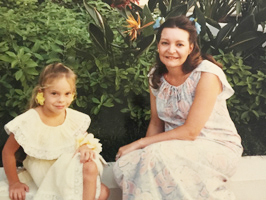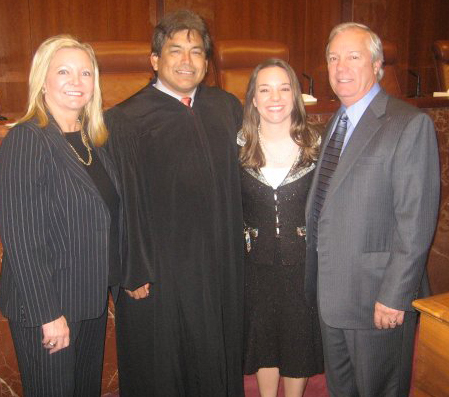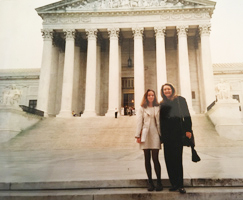© 2017 The Texas Lawbook.

By Courtney Carlson of Jackson Walker LLP
I became a “student of the law” at the ripe age of 6 in a law school class taught by my Mom, Professor Elaine Carlson. On days when I wasn’t in school or when child care didn’t work out, my Mom took me to her classes at South Texas College of Law Houston, where she still teaches today. There were no iPads back then for entertainment. Mom gave me a legal pad and pen and told me to pay attention. I loved every second of it.
 Always respectful of her students’ time and investment in their education, my mother wanted me to be respectful, too. Being quiet for a 90-minute class isn’t easy for a first-grader. So, Mom told me I could ask questions but cautioned that if I was distracting, she might call on me, and at least one time she did! Of course, I did not know anything about the case. Nonetheless, it showed my Mom’s devotion to her profession and students.
Always respectful of her students’ time and investment in their education, my mother wanted me to be respectful, too. Being quiet for a 90-minute class isn’t easy for a first-grader. So, Mom told me I could ask questions but cautioned that if I was distracting, she might call on me, and at least one time she did! Of course, I did not know anything about the case. Nonetheless, it showed my Mom’s devotion to her profession and students.
I also vividly remember the Goldilocks trial in second grade. My mom always volunteered at my school for Law Week and usually organized it, too. This particular year each student had a role to play. I prosecuted Goldilocks and prevailed. The jury found Goldilocks guilty; her punishment was to fix baby bear’s chair, make porridge for the bears, and six months of no TV.
At South Texas College of Law Houston, where my mother earned her law degree and has taught since 1980, her Texas procedure classes are courses that students love and appreciate. Former students come up to talk to her everywhere! Witnessing my Mom teach is truly a treat; she is in her element. As opposed to lecturing, she has conversations with her students, which has stuck with me. It would be easier for her to just tell students the rule of law, but it is much more meaningful to work with them and have the students come to their own conclusions. This technique also proves invaluable in litigation and one that I strive to use. If you only focus on the conclusion and skim over how or why you got there, you will miss nuances and creative solutions.
A full and democratic conversation is also how we handled matters at home. I am an only child, and in our family with a lawyer-mom and engineer-dad, we talked about everything and tried to solve problems logically, rather than let them fester. (Sometimes, as a kid, you wish you did not have to talk it through, but it taught me not to rush to judgment.) I remember commenting once about a trial and wondering how a jury could come to a particular verdict.
“You might disagree with the verdict and that is your right,” my mother said. “But remember, these are the people who have heard all of the evidence. You haven’t.”

There were other practices in our household that I learned did not necessarily apply to my friends who didn’t have a lawyer in the family. I had to read and sign contracts. The first was around age 14 when I got a cell phone. The contract listed terms such as, “Call your parents back within 30 minutes of their call.” There also was a formula for dealing with certain situations. When I damaged our car in a fender bender, the three of us split the bill and shared the cost.
When I was ready for college, there was no pressure to take the law school path. Both my parents were strong advocates for my finding an area of interest. I decided to major in business in the McCombs School of Business at The University of Texas at Austin. One of the required classes was Business Law, and I was hooked. I knew I was interested in litigation, so South Texas was a natural choice. Excelling in the law school’s renowned moot court program, with countless hours of help from professors and alums, solidified my desire to pursue litigation. With my Mom’s 30-plus-years devotion to the law school as an example, I had a desire to give back and have coached several successful moot court teams. And I am honored to serve on the Young Alumni Council and Alumni Association Board of Directors. I also followed by Mom’s footsteps and clerked for an appellate judge my first year out of law school. Mom and I have since co-authored numerous continuing legal education articles on procedural issues. Many know my Mom from her tenure on the Texas Supreme Court Advisory Committee and her treatise, “McDonald & Carlson, Texas Civil Practice.” It would be a lie to say I was never intimidated by my Mom’s successes, but she used her career as an example that I too could thrive in this amazing profession.
Currently, my mother teaches two classes, both key if you plan to litigate in Texas – Texas Pretrial Procedure and Texas Trial and Appellate Procedure. I was never a student in her class, though I had certainly attended many and have since served as an adjunct professor. Both my Mom and I took classes from my uncle and godfather, Professor Byron Davis, who also taught procedure and is married to my Mom’s sister, Carolyn, my wonderful godmother and a retired college professor.
 One thing I did not fully realize until law school was what a powerful role model my mother was not only to me but to a generation of lawyers. It never seemed unusual to me that she was a lawyer (and a renowned one at that), and it never dawned on me that I wouldn’t be able to become a lawyer, too. Thank you is an understatement, Mom!
One thing I did not fully realize until law school was what a powerful role model my mother was not only to me but to a generation of lawyers. It never seemed unusual to me that she was a lawyer (and a renowned one at that), and it never dawned on me that I wouldn’t be able to become a lawyer, too. Thank you is an understatement, Mom!
Courtney Carlson was elected Partner this year at Jackson Walker LLP where she practices litigation in the Houston office. Elaine Grafton Carlson is the Stanley J. Krist Distinguished Professor of Law at South Texas College of Law Houston, where she was honored as Alumni of the Year in 2008. She is also an elected member of the American Law Institute and has been recognized as one of the Texas Extraordinary Women in Texas Law.
© 2017 The Texas Lawbook. Content of The Texas Lawbook is controlled and protected by specific licensing agreements with our subscribers and under federal copyright laws. Any distribution of this content without the consent of The Texas Lawbook is prohibited.
If you see any inaccuracy in any article in The Texas Lawbook, please contact us. Our goal is content that is 100% true and accurate. Thank you.
